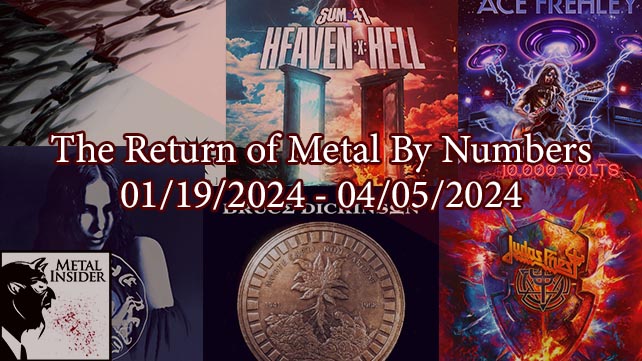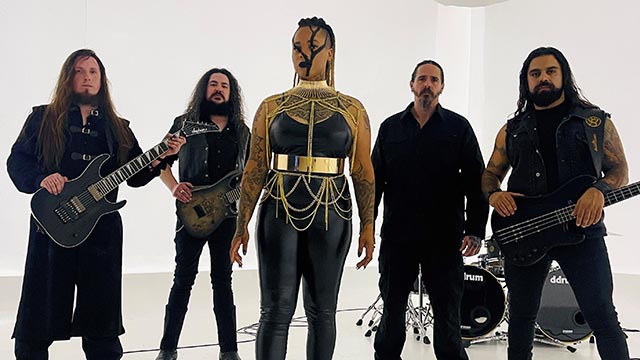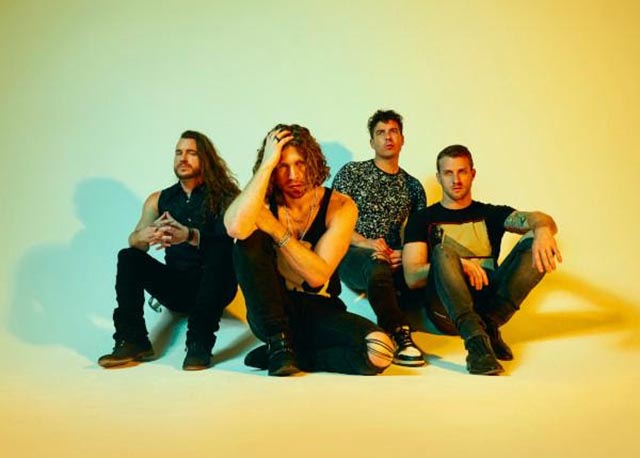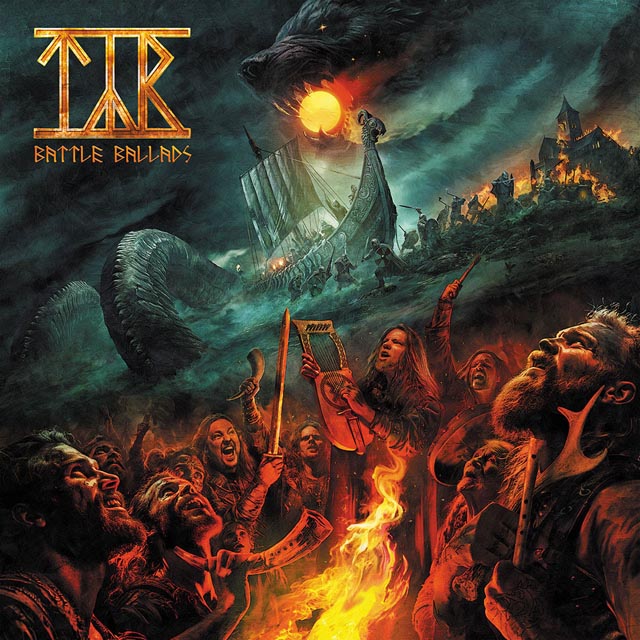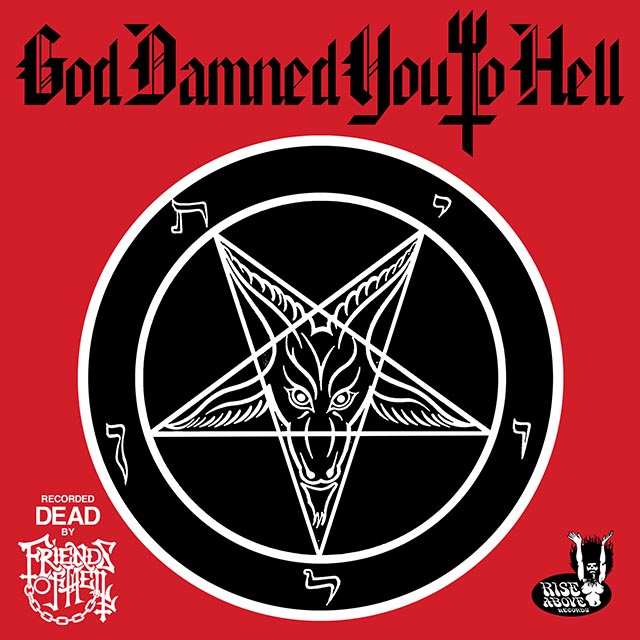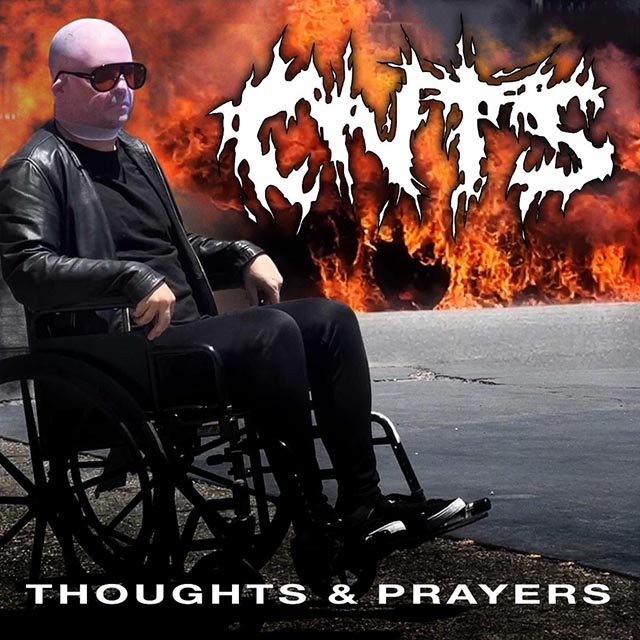 For over eleven years, Terror has served as a standout example of hardcore music. And on April 9, Terror continues the tradition with its fifth full-length album, Live By The Code. Frontman Scott Vogel, a vocal supporter of the underground music scene, took the time to speak with Metal Insider prior to kicking off Terror’s tour with Hatebreed. During our chat, the vocalist discussed how the word “hardcore” has been stretched to a fault, what gave him confidence in signing with Victory Records, the lack of care that goes into an album’s full packaging, and what he learned from Randy Blythe’s trial in Prague.
For over eleven years, Terror has served as a standout example of hardcore music. And on April 9, Terror continues the tradition with its fifth full-length album, Live By The Code. Frontman Scott Vogel, a vocal supporter of the underground music scene, took the time to speak with Metal Insider prior to kicking off Terror’s tour with Hatebreed. During our chat, the vocalist discussed how the word “hardcore” has been stretched to a fault, what gave him confidence in signing with Victory Records, the lack of care that goes into an album’s full packaging, and what he learned from Randy Blythe’s trial in Prague.
You have always been vocal about Terror staying true to its hardcore “roots,” a message the band continues to express with Live By The Code. What would you declare the “codes” of hardcore to be specifically?
Well I don’t know if you were given the artwork or layout. In a way, I can’t really just put into words without the artwork. We took a really long time, got an artist and really thought out the title because with a title like that, people are going to automatically think there’s a set of rules 1-10, like “these are the codes of hardcore, cut your hair short, wear this uniform, go into the mosh pit.” It’s absolutely nothing like that. Basically, I urge everyone who sees the title and really wants to know what it means, I don’t care if you buy the record or go to the record store and open it up to look in there and put it back on the shelf…I first urge everyone to look at that layout. People just go and either legally or illegally download the record and you’re only getting part of the record. I think that the full packaging on the record is very necessary to get the full understanding and full vision of the band. Music for some people is just something to put on in a car while they’re driving. I would think and hope that people in the underground take it a little step further than that. The artwork and everything we said in the layout clearly and fully describes what “live by the code” means to us.
To give you a short answer because I don’t want to just snub the question, there isn’t a written set of rules. I just think as someone that’s a member of underground music, whether it’s real hip hop or real metal or real hardcore, you’re not accepting what’s fed to you in the mainstream and what’s society says. So it’s of going against the grain and living your life your own way and taking your own path.
You briefly mentioned illegal downloading. Do you think that’s one of the single biggest things to change in the scene since you first entered the underground scene?
It’s crazy, I was watching a movie the other day, I can’t remember what it was. It was about newspaper editors trying to get jobs. All the newspapers were downsizing and cutting back on jobs because the internet has pretty much replaced newspapers. You can either stay at your house and look at everything for free or walk to the store and buy a smudgy newspapers for 50 cents or a dollar. It’s just the whole technology has done so much to change things, and in a lot of ways it’s an amazing thing. I can’t pinpoint that downloading is the biggest change in the hardcore scene. I wouldn’t say that. I’d say the biggest change is that the word hardcore has been expanded, stretched, perverted and raped so much that when someone says to me they’re in a hardcore band, I don’t even know what that means anymore. I don’t know if that means it sounds like Agnostic Front, Emmure or something in between.
I think downloading is really cool because in one way there’s so many bands out today it’s hard to keep up. It’d be impossible for people to buy every record that comes out today, there’s so much shit out. So if you want to look for new music, you can just download some stuff and see what catches you. On the other hand, people don’t get the full package. Sometimes you download a band’s unmixed record. I don’t want to make it out like I’m Mr. Musician, but before a record’s mixed it sounds totally different. So you can get a record and listen to it and say “Ah, this band sounds like shit” and you don’t even have the mixed record. Bands put out records today without lyrics sheets, which is insane to me. When I first got into what I consider “real” music, the first thing I did was sat down with the lyrics sheet and try to understand what the band is about. Today, some bands put out CDs without lyric sheets in the record and to me, that’s a fucking crime, man.
It is amazing to think that despite how the internet is poised to be something that provides enhanced interaction, that act of reading and interacting with the lyrics has been taken away thanks to downloading.
Yeah. And it would be so simple for bands to put their lyrics up on the internet, but they’re too busy putting cute pictures of themselves on fucking Twitter instead, which is stupid but that’s a reality.
I want to go back to how you mentioned that the word “hardcore” now could refer to so many different sounds. Do you think the fact that hardcore has evolved into other genres is for better or worse for the genre?
Worse [laughs]. To me, there have always been bands that take the sound of traditional hardcore and stretch it. I know when I was younger, like 17, I was pretty closed minded and I only listened to hard hardcore. I mean, I always listened to hip hop and I always liked Black Sabbath, Pink Floyd, and stuff like that, but when it came to the word hardcore, I only listened to hard hitting hardcore. Then a band like Quicksand came along, who featured members of bands that I really loved and they started something that still had the energy and the pulse of hardcore, but it definitely had more of a groove and more of a melody. There have always been bands that stretched the boundaries and I think that is a beautiful thing. But to me, what really defines a hardcore band really isn’t so much their sound, it’s the people in the band and how the carry themselves. If you’re in any band, though since we’re talking about hardcore I’ll say if you’re in a hardcore band, it’s important for you to be out and supportive of other bands, other shows and be involved. I feel that is part of the underground. If you’re a bunch of hardcore kids and your making music, even if it steps outside the box of what is so called traditional hardcore, I think it still keeps It hardcore.
There was a point where you really wouldn’t use the word hardcore because it wasn’t going to get you anywhere, it wasn’t going to get you on tours and it wasn’t going to get you on a record label. It was going maybe do the opposite of most of that, it was going keep you boxed in. But I think over time with bands like Every Time I Die and 18 Visions, who are definitely hardcore kids but they expanded the sound of hardcore so much and it opened it up to so many different people. But it stretched it so much outside the box that when younger fans that first got into music via Every Time I Die would hear them say in their interviews that “we’re a hardcore band from the hardcore scene,” they would be like “Well, I’m a hardcore kid from the hardcore scene, and my new band is going to be a hardcore band” but they have no concept of what that word means or where it even came from. That was 15-20 years ago. Now we’re talking 20 years later with that happening over and over. I can meet a kid who considers himself a hardcore kid who doesn’t even know who Agnostic Front is, and to me that’s a bad thing. You ask me if it’s good or bad, that’s a fucking horrible thing.
Well, Live By The Code marks Terror’s first album via Victory Records. You’ve been very vocal about your excitement over the band’s new label home, but I previously read that you did have a little skepticism about the label’s current roster. Since a lot of Victory’s roster is made up of bands that fall into the type of “hardcore” label you just discussed, what made you feel confident about signing to Victory Records?
Well, I’ve known Tony [Brummel, founder of Victory Records] since 1990, maybe. Me and Tony can have a conversation about music where the word Terror and Victory doesn’t come up because we grew up on the exact same type of music. When I was 14 or 15 years old, I had his band Even Score’s record. We come from the exact same place. Your right, I don’t know all the bands on Victory, but I’m positive that if you gave me a CD of their current lineup, probably 9 out of 10 I wouldn’t care for. It doesn’t mean that I don’t think these bands are good or quality music, but I don’t think that it’s something that would grab me and make me want to become a fan I guess, though I am not a big believer in the word “fan.” I’ve watched Tony’s label start from a tiny thing where he was probably doing it out of his home or apartment grow into the biggest hardcore label in the world without a doubt. And at that time, any record he put out, I would wait for and go to the record store in Buffalo and buy it as soon as it came out. And then, I can’t speak for him, but if I could assume or guess that, like anyone else, your musically taste starts to grow. Then you start to meet other people and you want to work with them, and you say to yourself “This isn’t in my fucking bedroom anymore, this is what I’m giving my life to, and sometimes I’m going to make decisions that are more so geared towards my career instead of my own personal music taste.”
There is something to be said about people that stick to their guns so much that they’ll never bend or never do anything with their head, they always follow their heart. That’s a great thing, but also a hard thing to do. I don’t know what decisions I would make if I owned a label and I probably don’t agree with every single thing Tony did and there’s probably some bands that I’d be like “Hey man, this band is really bad.” But he has built himself an amazing record label, and the roots of him and his label are everything I’m about. And for a band the size of Terror, I don’t want to make us sound like we’re some huge band, but we could really use the help of a nice big label.
Is there one particular new or rising band that you would say is “hardcore?”
There are a lot [of bands], but I would have to say the band Backtrack from New York on Reaper Records. We toured with them in the U.S. probably about three years ago for the first time, and they were a fresh band out with a 7” that I really liked. Maybe a year after that we went to Europe with them and they opened the tour we did over there. I’ve seen Backtrack play shows all the time, there the type of people I [previously] described. They’re always going to shows even when there not playing, their very supportive, they’re making fanzines. The singer of the band books other hardcore bands. They’re just very involved in the scene. We just did a U.S. tour with H20, and Backtrack was on that tour. Touring as a hardcore band is not easy on your brain, body, financially, everything. So to see them in the last couple years working hard and get the response they were getting [on that last tour], it made me really happy. To see a band like that, the right band getting love like that, made me super happy. There are a lot of bands out there that I feel are doing that, like Take Offense from San Diego, but I’d pick Backtrack to answer your question.
This summer, Terror will be touring with Lamb of God, and I know you and the band were extremely supportive of Randy during his ordeal in Prague. Given how stage diving, moshing and so forth are so prominent at hardcore and metal shows, did what happen to Blythe ever make you second guess about performing or touring?
I mean yes, it makes me think about it. And I would say there were things I’ve done throughout the eleven years of Terror, whether it be throwing a mic stand in the crowd, grabbing the monitor guy and throwing him against the wall, or I choose my words to make sure it [turns] chaotic and dangerous at certain shows [where] I think that security and the promoter are assholes and need to be taught a lesson. The stuff I’ve done over the eleven years that I don’t think I would do anymore. I don’t want to say I regret it, but I’ve learned and grown up from it. On the other hand, I think the energy and the aggression of hardcore is what it is, and it’s a beautiful thing. That’s like asking a football player if his friend broke his neck playing football, is he going to retire? Of course it makes you think about it, but the aggression, the energy, and the danger is part of it. That’s what attracts a lot people to it. Do I want to see anybody get hurt or die or see fights at our shows? Absolutely not. I think that if you have the mentality of coming to a show and you want to hurt someone, then that person is not welcomed at a Terror show. They should really think about why they are doing. But it’s not going to slow Terror down. It might make me think a little differently about how we direct our shows, but it’s not going to stop us.
[picture taken by Oscar McCall]

